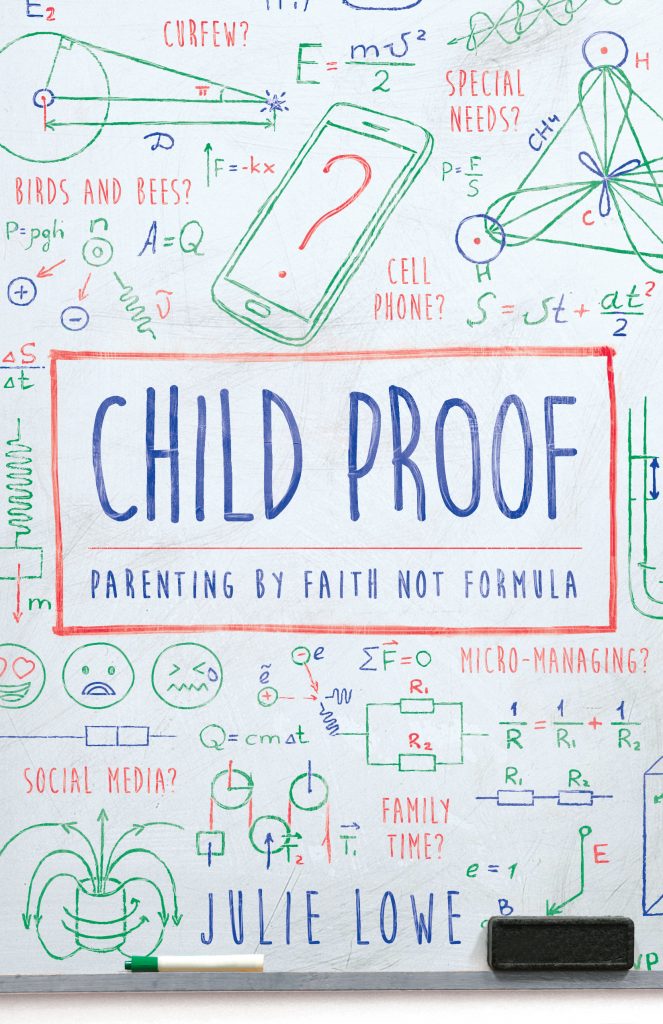At a meeting with my editor, I was holding a mug of coffee (essential to daily life) that read, “I childproofed the house, but they keep getting in.” We laughed about that—she has four children and I have six—but our laughter was rueful. Because the truth is we do want to childproof our homes. Not to keep our children out, but to make sure once and for all they remain safe.
What Parents Want
It’s what all parents want, right? Safety and a guaranteed good outcome. We want that so much we are easily persuaded to reach for a parenting formula or recipe—Do this! Don’t do that!—that promises to “childproof” our homes.
But parenting formulas don’t deliver promised outcomes (safe, happy, never-in-trouble kids). They also keep us from parenting by faith. We miss out on a rich life of trusting God to guide us in knowing and loving our children and guiding them toward love for God and others in ways that are specific to their unique gifts and needs.
As a counselor, I’ve met with many families seeking help with parenting questions or struggles their child was facing. Often parents wanted an immediate solution when what they really needed was time:
- To learn how to understand their children and what motivated their behavior
- To examine both the problem and their own responses to it as parents
- To discern what godly parenting responses looked like in that particular situation
Once in a while, there was a clear solution that could have been implemented immediately, but it was rare for me to be able to offer parents a magic bullet or quick fix.
Most of the time, when it comes to marriage and family life, it takes time to build trusting relationships, to know each other well, to know ourselves well, and to develop biblical insight that enables us to speak wisely and lovingly into another person’s life.
But when we take the time to learn how to do this and strive to love God and to love others with his love, we discover that God gives us tremendous liberty to express that love in ways that are distinctive to our situation.
God does not limit us; he liberates us to godly self-expression in the way we establish our home. (Click to Tweet)
Becoming an Expert on Your Children
Being an expert at knowing each of our children naturally leads to a commitment to shaping our parenting and our homes to serve our family well. This does not mean life revolves around any one person. Rather, it establishes Christ at the center and then seeks to minister to the individuals and to the family as a whole.
Being an expert at knowing your kids takes into account personal strengths and weaknesses, marriage, financial needs, careers, choices in education and extracurricular activities, ministry opportunities, church activities, and, overall, the things that will nurture the family as a whole and the individuals within it. Each decision can feel weighty when you are trying to balance multiple needs. Choices are made knowing there can be implications for everyone.
I didn’t realize it at first, but I had an idealized picture of the type of parent I wanted to be: calm, rational, easy-going, gracious, and wise—a sage in my children’s eyes. I wanted the type of relationship where I could sit down and reason with my children about their behavior and choices and win them over with my insight. This is not a bad ideal. However, I quickly came to realize not all of my children bought into it.
God Has His Own Plan for Our Children—And for Us
God gives us children with their own opinions, preferences, tastes, and natural proclivities. He gives them aptitudes and gifts that need to be encouraged and developed. They each come with personal weaknesses that need to be recognized or compensated for.
They are individually prone to areas of temptation and sin, and it is our job to help them see those areas and point them to Christ in their need. They are all given unique personalities by the Lord. In my experience, all of that shaped the work of discipleship Greg and I embarked on as parents.
Parenting by faith and wisdom does not mean we parent in a way that makes us most comfortable. When we base good parenting on what “feels right” to us, we mistakenly assume our parenting preferences are what’s best for our children, which may or may not be true.
A non-assertive parent may be given a child with disabilities that requires him or her to be the child’s advocate, to be assertive and push back when the parent knows more help should be offered. Another parent is affectionate and loves to touch but is given a child who does not enjoy demonstrations of affection. Another child’s bent toward fear and anxiety might rub up against a parent who enjoys adventure and risk-taking.
A single-parent home, a blended family, or a family where one parent has a significant disability will find that issues of discipline, homework, cooking, etc., will fall to the parent best suited for it (or the only parent). It might mean parents establish roles that are nontraditional—but they suit their gifting and the family’s needs. It might mean the father is the one best suited to be home with the kids after school to help with homework. It might mean the mother is the primary disciplinarian in a blended family.
You may desperately want to homeschool your children but, due to unexpected life circumstances or the clear needs and disabilities of your child, you find yourself relying on a school system better equipped to assist with your child’s educational needs.
Sometimes what we fear is settling for less is really God’s better plan. We need to be willing to let go of our plan and trust God to provide what is best.
Parenting Intentionally
Many of the parents I have counseled do not parent intentionally. Perhaps I should say, they do not intentionally evaluate the needs of the people in the family. Why is this true? Because we all receive help and input in different ways. We all have our own weaknesses, temptations, aptitudes, and disabilities that affect what we need to hear, how we hear it, and why we reject or accept it. We go on autopilot, relying on what we know, on our natural leanings, and on what we learned growing up.
Consider these differences I’ve observed in children I’ve counseled:
- Some children argue or are oppositional/defiant. They need structure and accountability.
- Some children nod their heads yes while silently disagreeing. They need someone to notice and gently call them out.
- Some children are sensitive, with a tendency toward fear. They may shut down. They lack self-awareness and need a patient adult to draw them out and reflect back to them.
- Some children demonstrate developmental delays or impairments that affect how they hear or process information. They need an approach tailor-made to their challenges so they can learn.
- Some children do not respond to laid-back parenting. They thrive on routines and rhythms. They need to be highly structured and disciplined or they fall into unhealthy or ungodly patterns.
- Some children do not respond well to overly structured households; they need grace and extra time, less pressure to think and accomplish tasks.
In this list, a parent’s response should be based on the needs of the child instead of the parent’s preferences. Your knowledge of your children can and should shape how you shepherd them, engage with their struggles and weaknesses, address the temptations and sin that entice them and encourage their strengths, gifting, and spiritual sensitivity.
Picture your son’s tendency to hide his feelings or the things that tempt him. Over time, you’ve seen this tendency; you’ve observed places in his life where he struggles with peer pressure or the desire to fit in with ungodly individuals. How do you approach him? Do you wait for the next situation to arise? Do you sit him down and go into a lecture that only you will appreciate?
Knowing your son’s struggle is only part of the challenge. Now you must pray for discernment in reaching his heart, reflecting back to him what you see and pointing him to Christ.






